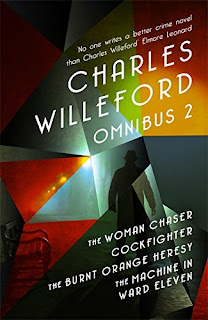The Woman Chaser - Charles Willeford
Written in 1960, The Woman Chaser by Charles Willeford has a deceptive title, but the path that it takes you down is also a deceptive one. It's clearly clever writing, all part of the author's way of drawing you to the book and immediately into the story. You are immediately taken into the confidence of the narrator Richard Hudson telling you his story, warning you that it's a typical success story gone wrong, but what it was that contributed to his downfall is harder to pinpoint, but by writing it down, he hopes to find out. Another hook is that although he starts out as a enterprising businessman in used car trade in LA, proud of his superiority to regular "Feebs" through some minor exploiting of staff and customers - he somehow becomes involved in the movie industry.
Based on the title you might think then that women are the key to his downfall - and they certainly have a part to play - but Hudson is surprisingly monastic for a large part of the book, and a little too proud of himself to ever fall for a woman, preferring to take or leave them as he pleases. There's certainly a danger presented by his unwitting (so he tells us) flirtation with his teenage stepsister, but he claims he is too smart to fall into that kind of trap. In fact, he's smart enough to see the traps all around, the American lifestyle, the Feebs who fall for it and achieve nothing of their miserable little aim of making money and looking after a family. His experience of life brings this sudden realisation that there is a movie in there somewhere.
It seems to be this involvement in the movie industry that is the main contributing factor in his downfall. Although it sounds like arrogance, a car dealer thinking he has a great ambition to be a writer and director of his own movie, at a time when such notions weren't common in the Hollywood system, Hudson actually demonstrates himself to be an educated, literary man, who knows his classical references and has an extensive knowledge of cinema, and the business side of the movie industry. More than that, he actually does have a unique compelling vision that he needs to share with the world, even if that vision does come across as someone arrogantly superior who has contempt for little people - a category of which women (his mother possibly excepted) also belong.
Hudson then is a man with a mission, and it's not just to make money. He genuinely wants to alert people to the poverty of their lives, their status as slaves, grist for the capitalist system. It's a realisation that he is happy to exploit, secure in his superiority for the finer things in life. He's going to make a movie that will shake the little people in the audience to their core, and if that doesn't work, he'll create a real life drama of his own. Much as Willeford does - without the arrogant superiority - pacing The Woman Chaser like a movie, sowing the seeds of the trouble to come, using cinematic screenplay references for chapters and sections of the book, using a narrator who is educated and persuasive, before delving into the darker side and delivering on the shocks in the best pulp fiction manner.
Reading notes: The Woman Chaser by Charles Willeford is included in the Charles Willeford Omnibus Volume 2, published by Orion in 2015. It appears to be currently out of print, but I picked up a copy from Chapters bookshop in Dublin. I have to admit, as a lover of classic American pulp crime fiction, I hadn't come across the name Charles Willeford before, but a brief browse - and an Internet search - was enough to convince me this was worth checking out. It looks like there is plenty of Willeford available in one form or another - not to mention two more novels and a short story collection included in this omnibus volume - so that's something to look forward to.




Comments
Post a Comment